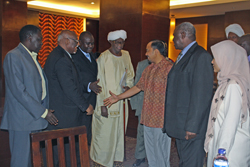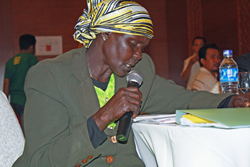In December 2009, Jason Gluck accompanied a delegation of officials and civil society leaders from Sudan’s Southern Kordofan and Blue Nile states to Indonesia for a five-day study tour of Indonesia’s recent experiences with secession and negotiated local autonomy. The lessons the Sudanese brought home will prove invaluable in the coming months as they design and implement their own process of self-determination.
Posted: January 7, 2010
By Jason Gluck
In December 2009, I accompanied a delegation of officials and civil society leaders from Sudan’s Southern Kordofan and Blue Nile states to Indonesia for a five-day study tour of Indonesia’s recent experiences with secession and negotiated local autonomy. Indonesia proved a fertile ground to mine the lessons learned from the successful resolution of two decades-long conflicts – East Timor, which won its independence in 1999; and Aceh, which negotiated substantial autonomy in 2005. For the Sudanese -- who after a half-century of civil war are now facing their own existential questions of autonomy, independence, and nature of their state -- the opportunity to visit Indonesia and talk with the people who went from rebels to statesmen was transformative. The lessons the Sudanese brought home will prove invaluable in the coming months as they design and implement their own process of self-determination.
 The Center for Humanitarian Dialogue and Conciliation Resources organized the study tour, financed by USAID’s Office of Transition Initiatives. Thirteen delegates each from Southern Kordofan and Blue Nile states represented state and local government, the dominant political parties, and civil society. I was invited to join as an expert on power-sharing and models of autonomy as well as broad based participatory constitution-making processes. The study tour included meetings and exchanges with current and former national figures in Indonesia’s capital city of Jakarta, including former Vice President Jusuf Kalla, who was a chief negotiator on the government’s side during the Aceh peace talks in Helsinki, and local Acehnese government and civil society leaders in region’s capital city of Banda Aceh. (Photo right: The deputy governor of Aceh greets the Sudanese delegation.)
The Center for Humanitarian Dialogue and Conciliation Resources organized the study tour, financed by USAID’s Office of Transition Initiatives. Thirteen delegates each from Southern Kordofan and Blue Nile states represented state and local government, the dominant political parties, and civil society. I was invited to join as an expert on power-sharing and models of autonomy as well as broad based participatory constitution-making processes. The study tour included meetings and exchanges with current and former national figures in Indonesia’s capital city of Jakarta, including former Vice President Jusuf Kalla, who was a chief negotiator on the government’s side during the Aceh peace talks in Helsinki, and local Acehnese government and civil society leaders in region’s capital city of Banda Aceh. (Photo right: The deputy governor of Aceh greets the Sudanese delegation.)
Though every conflict is unique, the parallels between Indonesia and the current challenges facing Sudan, and particularly these two Sudanese states, are stark, and were not lost on the delegation. Indonesia, despite its vast territory and ethnic and religious diversity has, since independence, been a highly centralized state. For this and other historical reasons many of Indonesia’s peoples have engaged in civil conflict and other acts of rebellion. Only in the last 10 years has Indonesia explored models of greater self-rule, with East Timor’s independence serving as the most dramatic example. Sudan now finds itself entering the final year of its Comprehensive Peace Agreement (CPA), the agreement that in 2005 ended Sudan’s half-century long civil war. The CPA, which is a series of protocols between the ruling National Congress Party (NCP) and southern-based Sudan Peoples’ Liberation Movement (SPLM), seeks to resolve several different disputes through various mechanisms. For South Sudan, the CPA culminates with a referendum for independence, slated for January 2011. The oil-rich state of Abyei also enjoys a referendum to determine whether it secedes with the south or remains in the north.
The CPA is not as generous to Southern Kordofan and Blue Nile in offering these states (many of whose residents fought with the south against the north during the civil war) something considerably less than a shot at independence. These states are to undertake a process of "popular consultation." "Popular consultation" – which is vaguely defined in the CPA -- is a process to ascertain the "will of the people" of these two states on the "shortcomings in the constitutional, political, and administrative arrangements of the [CPA]," which are then to be resolved by negotiation between the states and the national government. While offering a chance to alter the balance of power between the national government and the states, "popular consultation" clearly envisages an outcome wherein Southern Kordofan and Blue Nile remain part of northern Sudan.
The language of the CPA mandates an exercise to determine "the will of the people" – pretty revolutionary in a country where many citizens have never voted, let alone participate in a broad-based grass roots consultative process. And, with referendums for self-determination being conducted at their doorstep, many people in Southern Kordofan and Blue Nile states wrongly assume whatever else "popular consultation" is, it must include a shot at independence.
 It was with these challenges in mind – how to set up a genuinely participatory process and determining realistic outcomes and objectives of popular consultation – that the Sudanese delegates set off for Indonesia. Though the delegates learned a great deal from their meetings with national figures, it was their exchanges with the Acehnese that had so much impact. Acehnese negotiators and civil society leaders conveyed two lessons that profoundly impacted Sudanese thinking on their own forthcoming process. (Photo right: One of the Sudanese delegates makes a point during a session with negotiators to the Indonesian/Aceh peace talks.)
It was with these challenges in mind – how to set up a genuinely participatory process and determining realistic outcomes and objectives of popular consultation – that the Sudanese delegates set off for Indonesia. Though the delegates learned a great deal from their meetings with national figures, it was their exchanges with the Acehnese that had so much impact. Acehnese negotiators and civil society leaders conveyed two lessons that profoundly impacted Sudanese thinking on their own forthcoming process. (Photo right: One of the Sudanese delegates makes a point during a session with negotiators to the Indonesian/Aceh peace talks.)
First, well-negotiated and genuinely implemented autonomy can be more advantageous than independence. East Timor won its independence in 1999 and, in the words of one Acehnese official, gained the right to "live in poverty, its state managed by international organizations, its oil controlled by Australia." Aceh, by contrast, made the difficult and painful decision to forego independence for a favorable power-sharing relationship with Jakarta. The Acehnese credit this decision with the peace, stability, and investment that Aceh has enjoyed since 2005. For the delegates, the analogy to Sudan was obvious. As many observers now question the viability of an independent south, the states of Southern Kordofan and Blue Nile – even as they appear to be getting "less" from the CPA -- just may end up with the most stable post-CPA arrangement.
Second, the Acehnese were adamant that their negotiation with Jakarta would have failed without massive grassroots involvement and support. Achenese officials successfully mobilized people to conduct peaceful demonstrations, raise money and pubic awareness, and galvanize international support. Dialogue with the Acehnese taught the delegation how broad-based participation can empower local leaders, improve their prospects during negotiation with Khartoum, and provide for a more durable and popularly supported outcome.
During the study tour we learned the NCP and SPLM had reached agreement on a law for popular consultation. The law, which has since been passed by the national legislature, envisions a multi-staged, broad-based process, but leaves many of the details to state commissions largely tasked with carrying out the consultations. It is expected that the delegation that went to Indonesia will serve either as members of these commissions, a technical committee to advise the commissions, or both. There will, therefore, be ample opportunity for the delegates to inform the Sudanese process with lessons learned from Indonesia, and elsewhere.
The next steps are to design and begin to implement a strategy of consultation with the people of these two states, and later to begin to work through the myriad of options for dealing with the most critical issues – including wealth and power sharing, land reform, religious and cultural autonomy, and local security. USIP will continue providing support as the process unfolds over the next 18 months.



